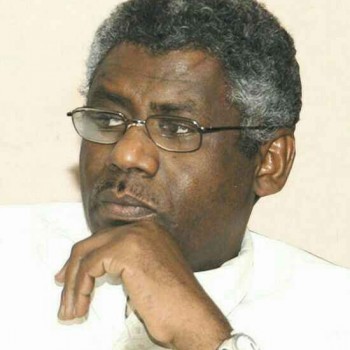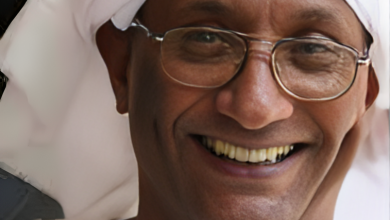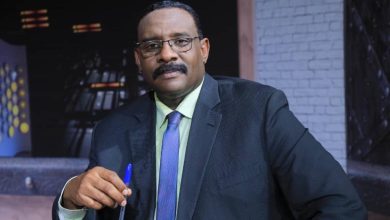From Bedouin to President…a Reading of Kaka’s Biography (5-5)

By: Adil El-Baz
As I see
1
We are still browsing through the pages of President Kaka’s book (From Bedouin to President), which is full of lies. In the first episode of the series of articles, we reviewed President Kaka’s position on the corruption that is ravaging his system, then we presented his position on his father and the old guard, and in the last episode we saw the state of denial that he assumed when he denied any connection to Hemedti’s rebellion and denied his support for him, despite all the available evidence proven by United Nations reports and reports from all over the world. He is the only one who does not see… not because he is blind, but because the clouds of Emirati bribery have blindfolded him. In the fourth episode, we saw how Sudan is accused of supporting the Chadian Florina movement, even though it is one of the most important African liberation movements. Now in this episode, we look at the state of denial that has not left it throughout all the pages of the book.
2
The Chadian president says in his book that “Chad never hosted a rebellion against Sudan, nor did the Chadian government.” Thus, the blind president may deny the sunlight from a political ophthalmitis. Anyone who reads the book on the Chadian/Chadian-Chadian-Sudanese conflict clearly sees how Chad has remained a starting point for all movements. The rebellion against Sudan, which caused permanent tension in relations between the two countries. It is true that Sudan’s interventions in Chadian affairs have always been a reaction to Chadian positions and its continued interference in Sudan’s internal political issues.
3
I convey to you what the Chadian writer Mohammad Ali Torshin wrote: Sudanese-Chadian relations: (its past, its present, and its future), condensing the history of Sudanese relations in the period after independence until the era of Inqaz (Sudan witnessed a number of governments in the sixties, which was the period of rule of (Aboud – Sir Al-Khatm Al-Khalifa – Al-Mahjoub – Al-Mahdi – Numeiri). In this era, we can say that relations were normal and lukewarm, given that the period following independence was an Arabist orientation, more concerned with the Middle East and the Arab region than with Africa, neighboring African countries, and West African countries.
As for the period of the seventies and eighties, Sudan’s foreign policy did not change, but rather it continued to move eastward, and General Numeiri had distinguished relations with the Egyptian and Libyan regimes due to the similarity of the military background of the three presidents. Despite this, we find that popularly, Darfuri society was greatly affected by the Chadian-Libyan war (1978-1987), which led to the participation of a number of joint tribal youth between the two countries to support the Chadian regime.
After the Inqaz regime or the National Congress government came to power in Sudan in 1989 through a military coup, it sought to export the revolution or export the Islamic tide abroad, so it supported and backed the National Salvation Front led by Idriss Deby in Sudan, and a large number of people from the border tribes participated in the battles against the regime. Hussein Habré until Idriss Déby, who belongs to the Zaghawa, was able to overthrow the authorities in N’Djamena (1990), and President Hussein Habré fled to Senegal thanks to the support and backing of the regime in Khartoum, considering that this constitutes a good start for the project of exporting the revolution and the Islamic tide abroad, which is the project that Inqaz tried to apply it in a number of neighboring countries.
4
Chad took a very important turning point with the outbreak of armed conflict in Darfur or after the emergence of revolutionary liberation movements in Darfur in early 2003, which was followed by a tense era in Sudanese-Chadian relations. Although Khartoum is the most important supporter of the regime in Chad, it began to support armed groups, specifically the Justice & Equality Movement (JEM) and he provided it with political and diplomatic covers. The Sudanese regime also treated the same way and supported the revolutionary movements in Chad, and Chad became a safe haven for a very large number of refugees, and they are still present in about a million refugee camps. Chad’s support for the Justice and Equality Movement (JEM) resulted in Operation of Long Arm (2008) until it penetrated into the heart of the city of Omdurman and its forces were on the outskirts of the Republican Palace.
5
It is clear from this review that Sudan’s only intervention since independence has been in only two cases. The first was support for the Florina Front in the 1960s, which was a liberation front, and the second during the Inqaz era came as a response to continuous interventions and support for rebel movements against the state. Sudan remained out of Chad’s regional conflicts with Libya and never entered into Chad’s external conflicts.
We conclude with this episode, reviewing Kaka’s book, which is worth reading, even though it is full of lies and a terrible lack of historical information, which are things that do not befit a president. The book contains many anecdotes and situations. It also included the strange biography of a president who openly conspires against countries and sponsors corruption, rising on the shoulders of modern colonialism and receives bribes from foreign countries and stains the blood of his comrades. He is accused of exterminating the soul of his father, whom he created with his own hands and under his eyes.!!



